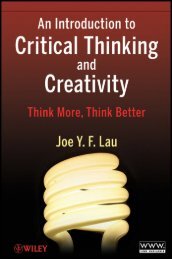- Page 4:
“ What always amazes me about Dav
- Page 8:
Brand Relevance
- Page 14:
Copyright © 2011 by John Wiley & S
- Page 20:
Contents Preface xiii 1. Winning th
- Page 24:
CONTENTS xi Does the Offering Have
- Page 28:
Preface During the last ten years,
- Page 32:
PREFACE xv There are dozens of othe
- Page 36:
You do not merely want to be consid
- Page 42:
2 BRAND RELEVANCE whereas the other
- Page 46:
4 BRAND RELEVANCE and being the num
- Page 50:
6 BRAND RELEVANCE Figure 1.2 The As
- Page 54:
8 BRAND RELEVANCE new tools, a new
- Page 58:
10 BRAND RELEVANCE The fi rst and m
- Page 62:
12 BRAND RELEVANCE There are a host
- Page 66:
14 BRAND RELEVANCE Figure 1.3 Brand
- Page 70:
16 BRAND RELEVANCE differentiation,
- Page 74:
18 BRAND RELEVANCE the competitor
- Page 78:
20 BRAND RELEVANCE the one UPS has
- Page 82:
22 BRAND RELEVANCE to some other st
- Page 86:
24 BRAND RELEVANCE A major risk is
- Page 90:
26 BRAND RELEVANCE The New Brand Ch
- Page 94:
28 BRAND RELEVANCE In the case of a
- Page 98:
30 BRAND RELEVANCE the brand role m
- Page 102:
32 BRAND RELEVANCE innovation. Or t
- Page 106:
34 BRAND RELEVANCE into a sustainab
- Page 110:
36 BRAND RELEVANCE newness (defi ne
- Page 114:
38 BRAND RELEVANCE A highly differe
- Page 118:
40 BRAND RELEVANCE champions of the
- Page 122:
42 BRAND RELEVANCE These works and
- Page 126:
44 BRAND RELEVANCE and transformati
- Page 132:
2 UNDERSTANDING BRAND RELEVANCE Cat
- Page 136:
UNDERSTANDING BRAND RELEVANCE 49 ch
- Page 140:
UNDERSTANDING BRAND RELEVANCE 51 ex
- Page 144:
UNDERSTANDING BRAND RELEVANCE 53 Th
- Page 148:
UNDERSTANDING BRAND RELEVANCE 55 Cu
- Page 152:
UNDERSTANDING BRAND RELEVANCE 57 Th
- Page 156:
UNDERSTANDING BRAND RELEVANCE 59 th
- Page 160:
UNDERSTANDING BRAND RELEVANCE 61 wa
- Page 164:
UNDERSTANDING BRAND RELEVANCE 63 Th
- Page 168:
UNDERSTANDING BRAND RELEVANCE 65 su
- Page 172:
UNDERSTANDING BRAND RELEVANCE 67 th
- Page 178:
70 BRAND RELEVANCE Retailers have s
- Page 182:
72 BRAND RELEVANCE but functional.
- Page 186:
74 BRAND RELEVANCE statement agains
- Page 190:
76 BRAND RELEVANCE business grows b
- Page 194:
78 BRAND RELEVANCE advantages. So h
- Page 198:
80 BRAND RELEVANCE would affect the
- Page 202:
82 BRAND RELEVANCE and related cont
- Page 206:
84 BRAND RELEVANCE go that involve
- Page 210:
86 BRAND RELEVANCE The Subway Story
- Page 214:
88 BRAND RELEVANCE The totality of
- Page 218:
90 BRAND RELEVANCE There were fi ft
- Page 222:
92 BRAND RELEVANCE hang from the ce
- Page 226:
94 BRAND RELEVANCE elusive synergy
- Page 232:
4 MARKET DYNAMICS IN THE AUTOMOBILE
- Page 236:
MARKET DYNAMICS IN THE AUTOMOBILE I
- Page 240:
MARKET DYNAMICS IN THE AUTOMOBILE I
- Page 244:
MARKET DYNAMICS IN THE AUTOMOBILE I
- Page 248:
MARKET DYNAMICS IN THE AUTOMOBILE I
- Page 252:
MARKET DYNAMICS IN THE AUTOMOBILE I
- Page 256:
MARKET DYNAMICS IN THE AUTOMOBILE I
- Page 260:
MARKET DYNAMICS IN THE AUTOMOBILE I
- Page 264:
MARKET DYNAMICS IN THE AUTOMOBILE I
- Page 268:
MARKET DYNAMICS IN THE AUTOMOBILE I
- Page 272:
MARKET DYNAMICS IN THE AUTOMOBILE I
- Page 276:
MARKET DYNAMICS IN THE AUTOMOBILE I
- Page 280:
MARKET DYNAMICS IN THE AUTOMOBILE I
- Page 284:
MARKET DYNAMICS IN THE AUTOMOBILE I
- Page 288:
MARKET DYNAMICS IN THE AUTOMOBILE I
- Page 292:
5 THE FOOD INDUSTRY ADAPTS It is us
- Page 296:
THE FOOD INDUSTRY ADAPTS 129 We sta
- Page 300:
THE FOOD INDUSTRY ADAPTS 131 Crete
- Page 304:
THE FOOD INDUSTRY ADAPTS 133 how to
- Page 308:
THE FOOD INDUSTRY ADAPTS 135 McDona
- Page 312:
THE FOOD INDUSTRY ADAPTS 137 found
- Page 316:
THE FOOD INDUSTRY ADAPTS 139 the po
- Page 320:
THE FOOD INDUSTRY ADAPTS 141 vigoro
- Page 324:
THE FOOD INDUSTRY ADAPTS 143 less r
- Page 328:
THE FOOD INDUSTRY ADAPTS 145 Mills
- Page 332: THE FOOD INDUSTRY ADAPTS 147 • In
- Page 336: THE FOOD INDUSTRY ADAPTS 149 have a
- Page 340: THE FOOD INDUSTRY ADAPTS 151 of lig
- Page 344: THE FOOD INDUSTRY ADAPTS 153 extra
- Page 348: THE FOOD INDUSTRY ADAPTS 155 • An
- Page 354: 158 BRAND RELEVANCE It was a produc
- Page 358: 160 BRAND RELEVANCE silos confused
- Page 362: 162 BRAND RELEVANCE challenge the K
- Page 366: 164 BRAND RELEVANCE With that backg
- Page 370: 166 BRAND RELEVANCE Sometimes there
- Page 374: 168 BRAND RELEVANCE base was undoub
- Page 378: 170 BRAND RELEVANCE Figure 6.2 Find
- Page 384: FINDING NEW CONCEPTS 173 equipment
- Page 388: FINDING NEW CONCEPTS 175 • Prophe
- Page 392: FINDING NEW CONCEPTS 177 Observatio
- Page 396: FINDING NEW CONCEPTS 179 LEGO const
- Page 400: FINDING NEW CONCEPTS 181 hidden and
- Page 404: FINDING NEW CONCEPTS 183 External s
- Page 408: FINDING NEW CONCEPTS 185 organizati
- Page 412: FINDING NEW CONCEPTS 187 did not re
- Page 416: FINDING NEW CONCEPTS 189 the produc
- Page 420: FINDING NEW CONCEPTS 191 course is
- Page 424: FINDING NEW CONCEPTS 193 The challe
- Page 428: Key Takeaways FINDING NEW CONCEPTS
- Page 434:
198 BRAND RELEVANCE The prospects o
- Page 438:
200 BRAND RELEVANCE leaning. It exp
- Page 442:
202 BRAND RELEVANCE Figure 7.1 Thre
- Page 446:
204 BRAND RELEVANCE had a smaller p
- Page 450:
206 BRAND RELEVANCE particularly ri
- Page 454:
208 BRAND RELEVANCE boring. Perhaps
- Page 458:
210 BRAND RELEVANCE can change the
- Page 462:
212 BRAND RELEVANCE Furthermore, mo
- Page 466:
214 BRAND RELEVANCE actually purcha
- Page 470:
216 BRAND RELEVANCE initiative. An
- Page 474:
218 BRAND RELEVANCE Home Depot, fou
- Page 478:
220 BRAND RELEVANCE to happen. The
- Page 482:
222 BRAND RELEVANCE focus on how to
- Page 486:
224 BRAND RELEVANCE Recall how info
- Page 492:
8 DEFINING AND MANAGING THE CATEGOR
- Page 496:
DEFINING AND MANAGING THE CATEGORY
- Page 500:
DEFINING AND MANAGING THE CATEGORY
- Page 504:
DEFINING AND MANAGING THE CATEGORY
- Page 508:
DEFINING AND MANAGING THE CATEGORY
- Page 512:
DEFINING AND MANAGING THE CATEGORY
- Page 516:
DEFINING AND MANAGING THE CATEGORY
- Page 520:
DEFINING AND MANAGING THE CATEGORY
- Page 524:
DEFINING AND MANAGING THE CATEGORY
- Page 528:
DEFINING AND MANAGING THE CATEGORY
- Page 532:
DEFINING AND MANAGING THE CATEGORY
- Page 536:
DEFINING AND MANAGING THE CATEGORY
- Page 540:
DEFINING AND MANAGING THE CATEGORY
- Page 544:
DEFINING AND MANAGING THE CATEGORY
- Page 548:
DEFINING AND MANAGING THE CATEGORY
- Page 552:
DEFINING AND MANAGING THE CATEGORY
- Page 556:
DEFINING AND MANAGING THE CATEGORY
- Page 560:
DEFINING AND MANAGING THE CATEGORY
- Page 564:
DEFINING AND MANAGING THE CATEGORY
- Page 568:
DEFINING AND MANAGING THE CATEGORY
- Page 572:
DEFINING AND MANAGING THE CATEGORY
- Page 578:
270 BRAND RELEVANCE computers. Tech
- Page 582:
272 BRAND RELEVANCE his help in bri
- Page 586:
274 BRAND RELEVANCE heritage, its p
- Page 590:
276 BRAND RELEVANCE Figure 9.2 Crea
- Page 594:
278 BRAND RELEVANCE Delivering an o
- Page 598:
280 BRAND RELEVANCE Brand Equity Br
- Page 602:
282 BRAND RELEVANCE always been an
- Page 606:
284 BRAND RELEVANCE resent a brand
- Page 610:
286 BRAND RELEVANCE Maine, Sam Adam
- Page 614:
288 BRAND RELEVANCE Branded Feature
- Page 618:
290 BRAND RELEVANCE a branded servi
- Page 622:
292 BRAND RELEVANCE Involving the C
- Page 626:
294 BRAND RELEVANCE Link the Brand
- Page 630:
296 BRAND RELEVANCE brand; energizi
- Page 634:
298 BRAND RELEVANCE a strong market
- Page 638:
300 BRAND RELEVANCE not only favore
- Page 642:
302 BRAND RELEVANCE This chapter wi
- Page 646:
304 BRAND RELEVANCE lingering memor
- Page 650:
306 BRAND RELEVANCE The stick - to
- Page 654:
308 BRAND RELEVANCE introducing Chi
- Page 658:
310 BRAND RELEVANCE investment is r
- Page 662:
312 BRAND RELEVANCE handicap becaus
- Page 666:
314 BRAND RELEVANCE diffi cult to a
- Page 670:
316 BRAND RELEVANCE externally sour
- Page 674:
318 BRAND RELEVANCE Branded Social
- Page 678:
320 BRAND RELEVANCE Beware of makin
- Page 682:
322 BRAND RELEVANCE their Genesis s
- Page 686:
324 BRAND RELEVANCE the Year award
- Page 692:
11 THE INNOVATIVE ORGANIZATION In m
- Page 696:
THE INNOVATIVE ORGANIZATION 329 emp
- Page 700:
THE INNOVATIVE ORGANIZATION 331 Fig
- Page 704:
THE INNOVATIVE ORGANIZATION 333 Fig
- Page 708:
Entrepreneurial Culture THE INNOVAT
- Page 712:
THE INNOVATIVE ORGANIZATION 337 als
- Page 716:
THE INNOVATIVE ORGANIZATION 339 the
- Page 720:
THE INNOVATIVE ORGANIZATION 341 pro
- Page 724:
THE INNOVATIVE ORGANIZATION 343 sub
- Page 728:
THE INNOVATIVE ORGANIZATION 345 org
- Page 732:
THE INNOVATIVE ORGANIZATION 347 com
- Page 736:
THE INNOVATIVE ORGANIZATION 349 exi
- Page 740:
THE INNOVATIVE ORGANIZATION 351 imp
- Page 744:
THE INNOVATIVE ORGANIZATION 353 3.
- Page 750:
356 EPILOGUE It is true that avoidi
- Page 756:
Notes Chapter One 1. From a talk gi
- Page 760:
NOTES 361 Across - Category Conside
- Page 764:
NOTES 363 3. “ Lexus 400, ” Toy
- Page 768:
NOTES 365 5. Tom Kelly, The Art of
- Page 772:
NOTES 367 18. Andrew S. Grove, Keyn
- Page 776:
NOTES 369 8. Pallavi Gogoi and Mich
- Page 780:
INDEX A A.1. steak sauce, 28 Aaker,
- Page 784:
INDEX 373 Chux, 32-33 Circuit City,
- Page 788:
INDEX 375 work” concept, 330; Ima
- Page 792:
INDEX 377 Magee, D., 327, 329 Marig
- Page 796:
INDEX 379 Rakuten, 70-71 Ralph Laur
- Page 800:
INDEX 381 offerings, 124, 155; over

















